Distinctively British
The efforts to shoehorn and impose a British identity onto people in Scotland, and England and Wales is a strange phenomenon.
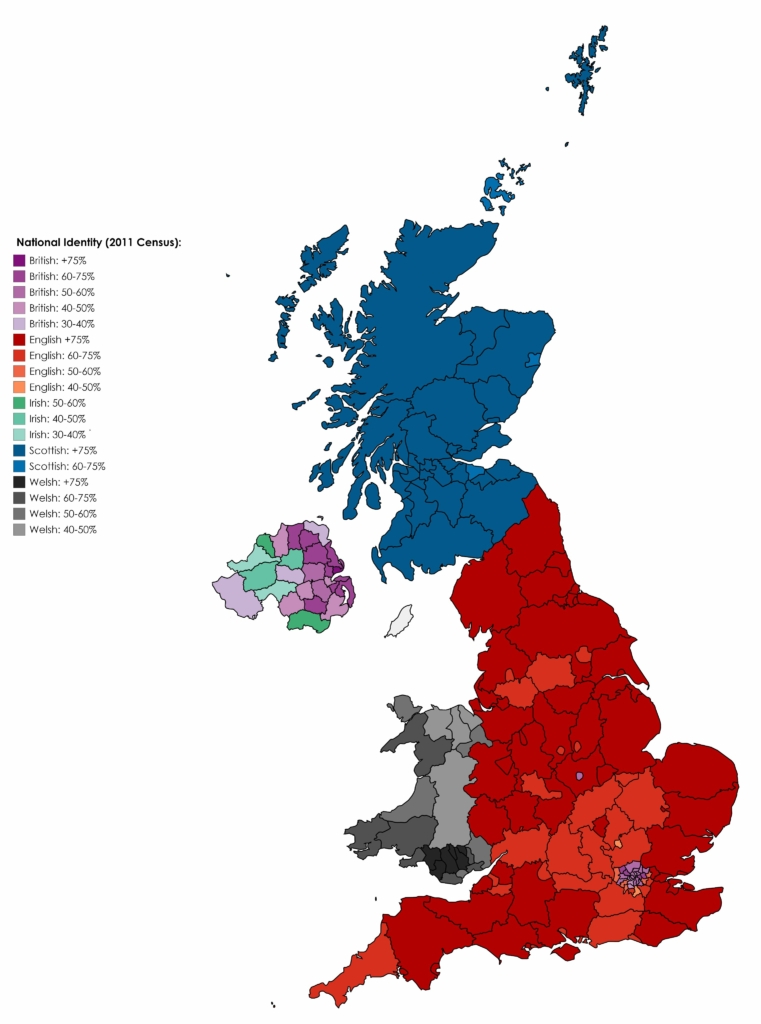
Today Keir Starmer, spluttered out an assembly of words, some of which didn’t really mean anything at all, like ‘A productive Liverpool is good for Birkenhead. A strong Dudley is good for Birmingham’, all in an effort to make himself Tory-friendly with some barely coded ‘pro-business’ rhetoric.
He said he won’t be ‘ideological’, which we all know is code for “I will be ideological just in right-wing terms that are deemed non-ideological”.
Only the left has ideology. The right is just ‘common sense’.
In Starmer’s keynote speech, delivered in Liverpool, he promised that Labour would not be “trapped” in its history, and would focus on growth rather than redistribution. This again is code and a declaration of intent. Week by week Starmer is dismantling his own programme so the right wing media don’t have to.
The speech was a mixture then of hints at a drift to the right, abandoning promises he ran on and flying the flag for British nationalism, plus disinterring Gordon Brown for some vague waffle about ‘economic devolution’.
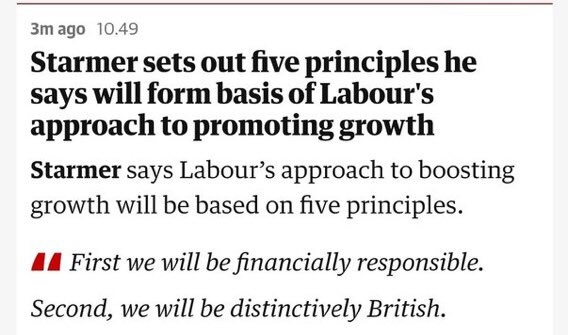
It’s all strange not just because the notion of Britishness is a dying identity, but the opportunity for a different politics after twelve years of Tory rule is so potent, so palpable you can taste it.
Instead you get this uber-bland watered-down nothing politics. His latest climb-down was to back his shadow chancellor, Rachel Reeves, who suggested Labour had ditched plans to take rail, water and energy back into public ownership. Asked on the Today programme on Monday whether Labour supported the nationalisation of rail, water and energy, Reeves pointed to the fact that Starmer had scrapped the 2019 manifesto, and suggested the policy would conflict with her determination to balance the books.
Yet considerable evidence shows wide public support for public ownership:
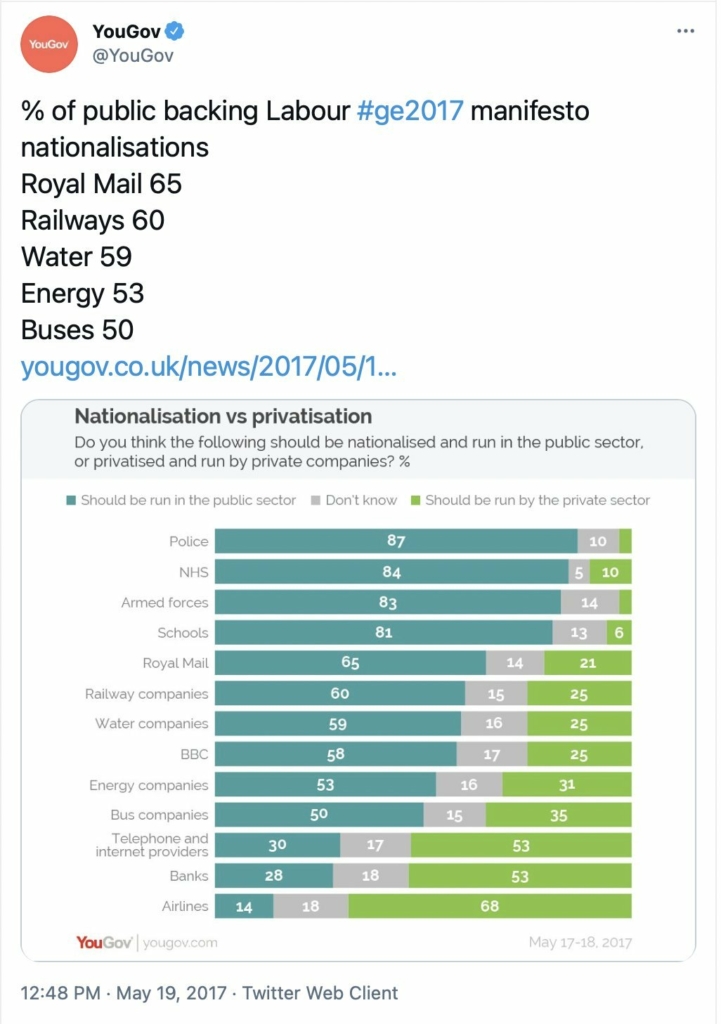
And so you are left with a meaningless futile opposition when the Conservative’s are at their lowest ebb, exposed as never before and about to elect a halfwit.
But these two phenomenon are linked.
The demise of British identity is intimately linked – not just with the rise of distinct Scottish and English identities among new generations – but the closing down of meaning in Britishness is also connected with the privatisation of much of the nominally ‘British’ economy. It’s ironic then, that the people who most obsess about Britain and Britishness are the same people who sold it all off.
Having sold off BP (stakes sold off between 1977 and 1987), British Airways (1987), British Steel (1988) and Coal (1994), and all the utilities: gas (1986), electricity (1990-1995), telecoms (1984-1993) and water (1989), now they want you to get all patriotic?
Only the NHS stands a sort of iconic, symbolic emblem of Britain, as the rest of the family silver has all been flogged off, and even here you can see the Tories salivating at the prospect of further privatisation.
Now as ‘the country’ is literally crying out for change, they are being presented with a programme that is indistinguishable from the Conservatives (not the current mad Revolutionary Conservatives) but the old pre-Boris Tories:
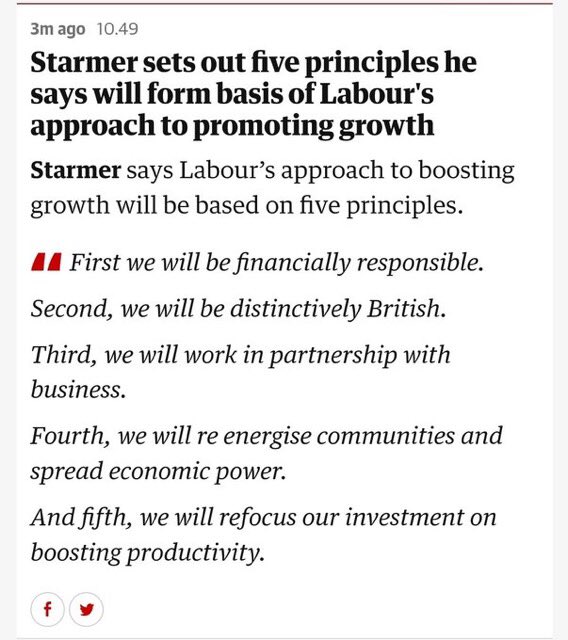
Starmer’s Labour are messaging like a milquetoast version of the Conservatives with more Union Jacks.
But the open door being missed here is not just the obvious opportunity for drawing on a narrative of national reconstruction and unity that should be easy-meat for a Labour Party. The ‘country’ is crying out for a figure to construct a story about post-covid, post-Boris, post-Brexit recovery. But it’s not just the economic and social crisis that should be low-hanging fruit for any half-decent Labour front bench. It’s obvious now that ‘England’ itself as an emergent inchoate entity is an obvious and natural vehicle for a radical left.
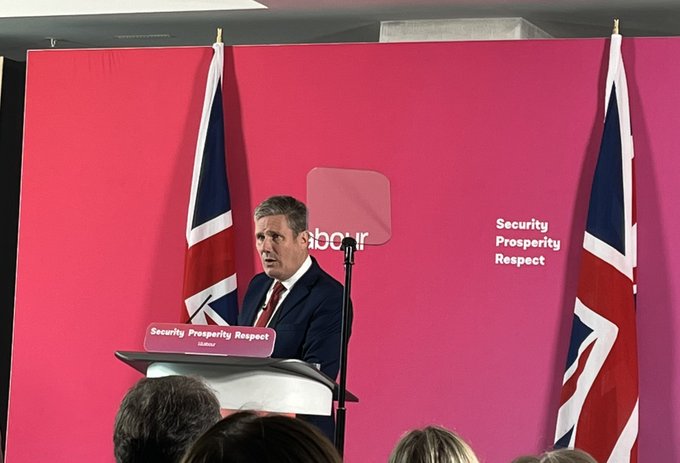
This might seem counter-intuitive but the opportunity to garner some of the energy behind Brexit and re-direct it for positive change seems obvious. Post-devolution Britain is a very different place, and the pandemic only amplified these differences and contradictions. A progressive left with some guile and imagination could easily move forward with a programme of social and constitutional reform that made sense and gave England both voice and place.
That’s not going to happen. Instead we will have a return to a compulsory nationalism and a forced Britishness – which is a cultural and electoral dead-end.

Help to support independent Scottish journalism by subscribing or donating today.

The map says it all. I don’t doubt its accuracy, but can you link to the source?
Hi Dennis – I’ll try and check
I truly wish you were wrong on this Mike, but once again the nail has been hit firmly on its head. I despair.
Keep going with the excellent articles.. You’re obviously making folk feart… I suspect you won’t be offered a gong one day….
Since the time of Sunny Jim Callaghan the Labour Party has been wilfully unable to grapple with anything approaching socialism. They have mired themselves in a weird version of British Imperial identity politics. I hold out little hope of anything much good ever coming from there, Corbyn was willing to say that Scotland leaving the Union was a matter for Scotland, and look what happened to him.
How many more times will we witness the bizarre single anthem played during this month’s Women’s Euro 2022 fixture between Northern Ireland and England?
https://www.bbc.co.uk/iplayer/episode/m0019744/womens-euro-2022-northern-ireland-v-england#t=26m45s
Yes, Labour’s leadership’s betrayal of the fundamental idea of representative democracy (meaningful choice) could have dire consequences. Their programme seems Toryesque in feeding the fire. People will turn elsewhere to solve the problems largely caused by successive governments under emergency conditions (how long will farmers endure water insecurity, for example?).
Hi Mike,
Absolutely.
I remember emailing a Labour friend in Brighton back in the Corbyn days arguing that JC was missing a big trick in not wrapping himself in the English flag and celebrating the radical English tradition of the Magna Carta, Wat Tyler, Diggers and Levellers, Tolpuddle Martyrs, Rochdale Pioneers, Peterloo, Chartism, Wilberforce, the 1911 National Insurance Act, suffragettes, universal suffrage, the welfare state, and more.
My point wasn’t that all the nations of these islands couldn’t or shouldn’t embrace the same tradition, and add their own achievements to it, but that England was clearly needing to assert its identity. So the choice was between offering England its radical self or its reactionary self. Avoiding the question left the outcome in reactionary hands. And so it has proved.
It’s one of the ironies of devolution that it unleashed England upon us. Maybe in a united Britain the English would have been happy enough in the EU.
But the clock can’t be turned back.
Scotland and Wales now exist as democratic nations.
When will Labour wake up from its 1940s British dreams?
Not under Sir Keir.
A reactionary Brenglander.
Excellent analysis
Showing the poverty of ideas from ‘British’ Labour
Clearly we need to leave them to it and build Scotland in Scotland for Scotland!
Seeking to deny people their right to identify as British is as repulsive as seeking to deny people their right to identify as Scots, Welsh or English. How socialist would you regard an Independent Scotland as if it was involved in a race to the bottom on corporate tax and legalised tax dodging on the Irish model?
‘British’… in my mind very much wrapped up with imperialism.
Living in north London [but also with a Franco-Bengali background, legacy of the Raj], I agree that “England” is the elephant in the UK polity. But it is a complex place – the Cornish deserve recognition, as do many of the ex-imperial minorities; this is particularly obvious in London which has its own Assembly of sorts.
It is not simply possible to translate the “small-nation” status of Scotland or Wales to England. England itself has its own regional identities which would need to be recognised in some sort of federation/confederation in Our Islands. The little known “British-Irish Council”, which I had a hand in designing, may be some sort of prototype https://www.britishirishcouncil.org/ Will Gordon Brown come up with anything?
The British-Irish Council which has representatives from the UK Govt, Devolved Govts, Crown dependencies but studiously ignored England? The largest country on these islands doesn’t exist according to the British-Irish Council, except to foot the bills. I don’t want England to be balkanised thank you very much.
Living in west East Lothian, I have to say that Scotland also has its own regional identities.
Aye, in terms of nativity, my auldest laddie’s a Panner and my neist-auldest’s a Belter. In terms o citizenship, they’re baith currently Glaswegian (insofar as they baith participate in the civic life o that imagined community), Scottish (insofar as they participate in the civic life o ‘Scotland’), and British (insofar as they participate in the civic life o ‘the UK’).
Thanks Simon. But we don’t have to be so hide-bound as to assume that a devolution – or preferably an independence – for England would have to mimic the forms of the other countries? An indy England could have regional assemblies within it, or whatever it liked?
Spot on Mike. Starmer’s insistence that there will be no unwinding of Brexit will also come back to bite him. If the Tories are wiped out at the next election they’ll purge the clownites, ‘rebrand’ themselves as one nation Tories, become the party of re-join, tap into the silent re-join majority in the country and get elected in a landslide while Starmer looks on like old Dan Tucker.
Labour are no longer a socialist party, they are a carbon copy of The Tory party, hopefully the Scottish people see them for who they are. Independence is our only hope imho.
He’s clearly trying to be a new Blair but without the crucial charisma and persuasive powers, that whatever you think of that man, he very much had and won three elections with. It is very disappointing and I agree that with the Tories as they are right now, a more radical but competent approach from Labour seems a no brainer.
One point about Britishness – yes, most people see themselves as English first and definitely Scottish and Welsh and either say British next or grudgingly have to accept they are so by default even if they feel no identification with the word. But there is an exception and that is all the ethnic minorities (very considerable in England) where British identity is actually important in their sense of belonging. Though it is slowly changing, English, Scottish and Welsh are primarily seen as ethnic distinctions, British not. So without a British identity where does that leave those who are not ethnically English or Scottish? The ideal is that everyone can be Welsh, English or Scottish if they are citizens of said country but we are quite a long way from that just now.
Agree with this 100%.
In England it’s impossible for a black English person to self-classify as such on the census etc. Black and Asian people are pushed down the Black/Asian British route.
The UK Government is effectively saying that in England it’s only possible to be White and English. The sooner we have English political and and civic institutions to foster a multi-racial English identity the better. Unfortunately, the political elite of all parties are determined to enforce Britishness on England only.
Crikey!
Youre on the money with this one, mike
Privatisation of the public utilities has not been a success in the UK, to put it mildly, and so it is deeply disappointing that Labour seems to be turning its back on nationalisation. However, it is disappointing as well that so much of the discussion within the left seems to be focused on the sole issue of state ownership, to the exclusion of other types of social ownership and consensus-building. In this regard, the discussion feels as if it could have taken place at any time since about 1975. I sometimes wonder whether this might help to explain why the Left seems so unattractive to many.
The recently published Scottish Government paper (the first in the independence series) on other small European countries was a breath of fresh air in this regard, focusing as it did on some of the alternatives currently in operation in many small European countries, that might provide exemplars for an independent Scotland. I did not know, for example, that cooperatives in the Netherlands accounted for 83% of market share in Agriculture, 60% of Forestry in Sweden, 35% of Banking in Finland. Nor had I heard of the wonderfully named Danish Disruption Council that seeks consensual solutions to societal problems, involving trade unions and business owners. Or of the Industrial Foundations where business donate a controlling share to a Foundation (the Guardian seems to be the only example of this in the UK), thus encouraging longer-term investment rather that the short-termism that governs much of the UK’s corporate sector. There are lots of other examples in this paper, such as Sweden’s Job Security Councils, covered in useful detail. A truly radical alternative would seek to embrace these options.
“Post-covid”. Really? You seem sound on most issues, so why are you a libertarian extremist when it comes to protecting the most vulnerable at the height of the pandemic? Ask Sally Wicher if we are “post covid”. That is a phrase cooked up in a Tory think tank. Why do you use it?
I have to confess I missed that in the text – possibly seeing it as a projection of the future or just another example of my being brainwashed when bombarded with all the usual corporate nonsense that hides the truth. How on earth are Elephants an endangered species when there’s one in every bloody room? Fair point, well made Alvin. Thank you.
With hospitals full, post-Covid is looking a lot like peak-Covid.
Recommend this article in NYT: https://www.nytimes.com/2022/08/01/opinion/britain-brexit-truss-sunak.html?smid=nytcore-ios-share